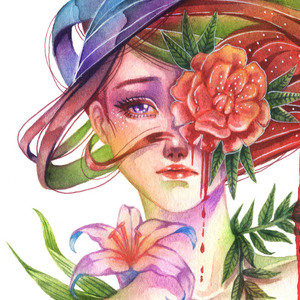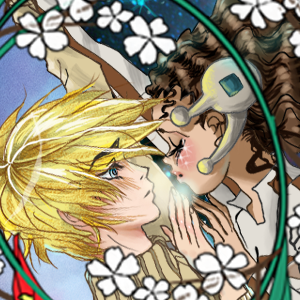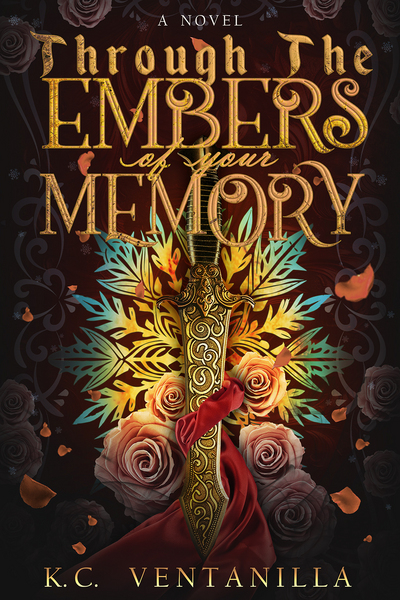Sirius pulled the carriage to a halt the minute he reached the outer threshold of the ghetto. The stench reeked even from a distance. Travelers would know they’ve arrived even without a landmark. It stank of gutter, shit, and dead rats. Someone must have made a meal with the rodents recently.
He led himself into their den without much noise. He proceeded to drop the cargo on the one trading post stationed in the middle of the shacks—the dilapidated walls they called home.
The decaying town was not a sight for pleasant vicinity. Not the houses built of rubble, thin bamboo and thatch roof. Not the smelly streets and bridges. Not even the ones living there. Truth be told, he did not want to be there, not because of how discriminatory it may sound. It reminded him of struggling lives ready to give up everything just to raise their families. To better their condition. They were the disregarded blessings forced from the bounties the world had to offer. Apparently, just like him.
Yet the people who lived in such deteriorated condition were happy enough to be there. To live. This humble portion granted to them was not appealing for any stray visitor, but at least they had something to call their own. And that counted as much.
Sirius looked back from when it all started, why he accepted the hand that offered him shelter once. Dyie. It was there that a beam enlightened him. He was there because he felt the need to do this for them, soiling his hands to provide the necessities. But what was in it for him? He did not exactly know.
They disliked people like him because they believed them to be unrighteous. Murderers of thieves and thieves themselves. People judged and they were incredibly good at that. They pulled each other down, snapping their claws to dismantle those who thrived, preventing them from climbing the ladder.
He held his breath, feeling defeated at the turmoil whirling within his thoughts. Humans were a complicated bunch, if only life could make things easier. But no. For even a lioness must hunt to feed its pride.
When he started to leave, he caught a girl, no older than sixteen, standing by the door of one of the shacks. His eyes widened and stared right back at her. His senses blared for him to move.
Shit. Someone saw him. She gave him a look like he was the most despicable being on two legs. Senseless horror and disgust were on her face.
Caught off guard, he immediately pulled the scarf up to conceal half his face.
Damn it! His mind wandered. He placed a mental reminder not to make the same mistake again.
“Help! Someone! It’s one of those errand boys! He’s come for us! To kill us!” The girl screamed, alerting the neighborhood. She had done a good job in acting hysterical. He gave her that at least.
The shanties illuminated upon the distress. Their windows reflected the fires caged within their homes. By means of treasuring life before trial, that became Sirius’s signal to take his leave.
His horse awaited at the border of the ghetto, tied to one of the dead trees. He dashed through the shanties, avoiding every cornerstone, every debris, that crossed paths with the rallying noise of the ungrateful.
He still valued his life. But perhaps fate had a way for him to pay for those he’d stolen and introduced to the underworld. He knew one day it might come, but now was not the time. He still had something to do, something to carry. Or something to bury. The bodies he never counted continued to pile up each night whenever new tasks arrived. It always involved people. Bad ones. He didn’t wish for them to come his way, they wished for it, battling with his better judgement. Everyone was a survivor.
He hopped onto the horse and reared it into motion away from the ghetto. He looked back, attempting to count the number that followed behind his trail.
In that instant, an arrow scraped its way through his shoulder, breaking open a wound. Fortunately, he had already gone by a good head start before they even got a grasp on him. He would be dead by daylight if he lingered any longer.
He focused on the path back to the heart of the city, ignoring the rising pain in his shoulder. The archer got him good, he admitted. He glanced at the wound. Aside from the blood attempting to seep out, a black liquid surrounded the gash. He grimaced at it.
His vision doubled. But he blinked it away.
When he was within the familiar roads of the city, he left the horse near the red-light district in case they decided to track him. That ought to either make them spend the night on a stack of hay, or land on someone else’s bed.
He blinked several times to focus on the dark streets that lay ahead. Lightheaded, he supported himself against the wall of a steel building. He looked at his hand, stained with rust. Every steel building in the city corroded slowly. He wiped off the rust before he could even make the mistake of clamping it on his wound.
The streets and alleys were empty and silent save for the pitter-patter of water dripping down the roof, the liquid it caught from the fog during the night’s ordeal. Dawn would be arriving soon. He didn’t have the strength left to return home. Dyie’s house was the only property that rested atop the hills overlooking the city. Like a beacon of untouchable power.
It might take a while before he could track the road back to the bosom of safety. But he knew of one other refuge, one who wouldn’t deny him shelter just as much. If it wasn’t something else, he would call it his second home even if it was only in that one bedroom.
He blinked and saw double. He blinked again several times until his gaze focused to a steady. Only to fail every time.
His steps were careful, silent, as he prowled the grounds. He compressed the throbbing wound, trying to stop the flow of blood which had already drenched his sleeve. Because right now it burned to a point where he felt a thousand forges trimming the fats of hell into piles of frozen lard.
That damned arrow. He gritted his teeth as he traversed the groggy path to a familiar sight.
He climbed over the gate, almost broke an ankle before he landed carelessly. At least he could still do that without raising another alarm.
No one was up by this time of the night, giving him the ease of travelling towards a certain balcony on the second floor. It wasn’t locked, but then when was it ever? He welcomed himself inside.
From the darkness, he traced the bed positioned adjacent to the wall, centered. The room wafted of witheroses and desert lilies. A figure lay by the bed, sleeping in serenity. How he wished he had that kind of luxury every night. Sleep.
As his thoughts shifted, he thought about noct scorpianas. Ravenous arachnids concealed within the scorching dunes of the desert wastes, waiting to strike on anything that crossed and fouled its territories. But they were known to be reasonable creatures. Only if they’ve been paid tribute to survive the harsh environment through the embodiment of another creature’s bones.
They sought not for guts and blood. For if they wanted to maintain their raven shells, their protection from trouble and its kin were bones that nourished them.
Sirius went for the couch thinking about the arachnids. Stupid scorpianas. Why was he thinking about them right now? He was being delusional.
He glanced to the side. A bowl of water stared back at him from the side table almost like it read his mind. He ripped off a piece of cloth and dipped it into the water before wiping off the blood from his shoulder. He saw duplicates of everything around him. Like the elements danced to mock his vision. His hand trembled. He couldn’t even hold the damn pressure on. He tried to keep a steady breath, but even that didn’t seem to work.
While he battled against tending his wound, he glanced at the window where the night sky was shown. It casted webbed shadows into the interior.
The witheroses stood where he last seen them. Even under the darkness, they emitted an elegance that can only be appreciated in the wasteland. For it was only in the wastes where it was given the privilege of handling such fragile beauty.
“Rius?”
Oh, crap. He shifted to where Caltha had risen from the bed. She turned a lamp on and went to light the one nearest to where he was. Groggily, he could see her outline. She wore a white nightgown. Something that delicately hugged all the right—yeah, you know it.
When she walked towards him, he thought the fabric of her dress purposefully followed the sensuality of her movement. For the first time since they had met, he felt like a real intruder. You delusional freak.
“Is that blood?” She stood before him. Without giving him a chance to answer, she reached a hand to touch his cheek to make him look at her. He realized he was avoiding her gaze. Avoiding her everything. “What happened?”
“Hell broke loose.” He began to question whether it was bad to just stare at her that way. He didn’t know how to say the words, or even spell them. He could not think right and it was getting heavy all over. He focused on her eyes, at least the lavender in them kept him steady.
But slowly, it seemed even staring at her started to wane because everything began moving. It was like a maze and he could not make the attempt to solve his way out of it.
Calla. Focus on Calla. He did. As best he could, he did. It was the only thing that brought him sanity aside from the sweat that broke, the pain spreading within him, and the lightheadedness that hammered at his temple.
“You’re pale, Rius. You don’t look okay.” Caltha urged him to lie down. The cottony sensation that was supposed to be her touch took merely a pinch away.
Little did she know, she sounded but a slur and appeared like a blurry wall of frost to him then. He fought to keep his consciousness going for the remainder of the night. His head collided against the warmth of her chest unintentionally. It did nothing to alleviate the pain. His breathing was shallow as if he fought invisible chains blocking out the only means he could actually live through the toxin.
The ceiling spiraled in a way that brought nausea. Thoughts of dying bore him inevitable, vulnerable. It chased him to a path where he had already delivered most men. He could feel his guts churn in a cyclone of agony. Despite that, he was aware that he was not in his room, urging him to remain silent lest he drew any attention. He blamed being careless awhile back. Now, he struggled to keep whatever was supposed to be between the dividing line of life and death. His life? Laughable.
He still had one question thrown at him that needed answering. He thought about what Dyie said before they parted that night. It was about his recent encounter with the people from the mainland. The argument that sparked Castellone’s ire and debated the ethics drawn from his morals.
It may not be now. But I’m rather curious about what you’d do the minute you found a problem where either choice wouldn’t make things better.













Comments (39)
See all